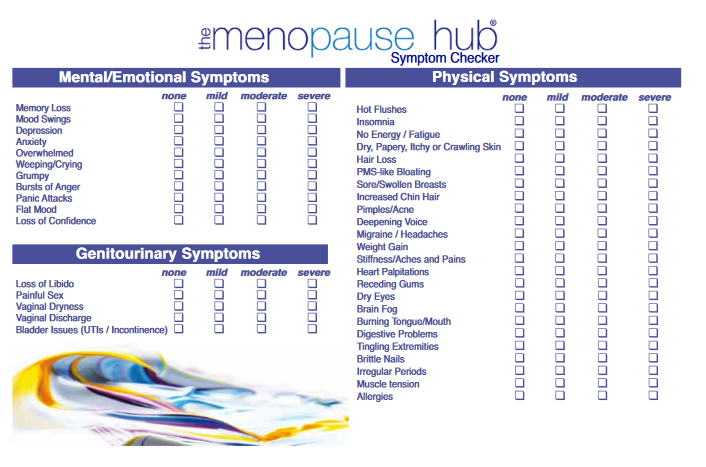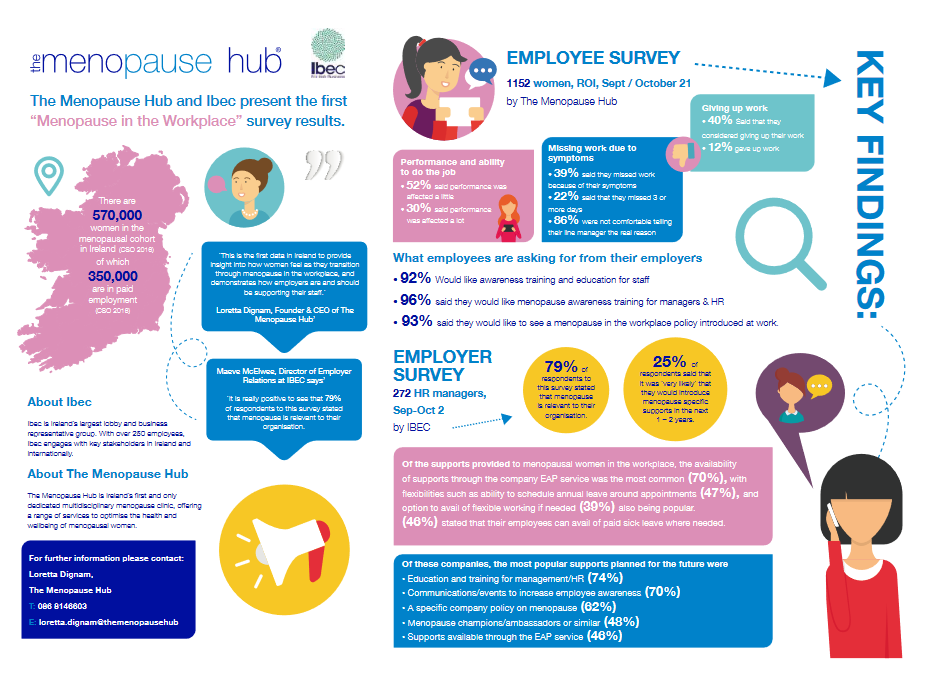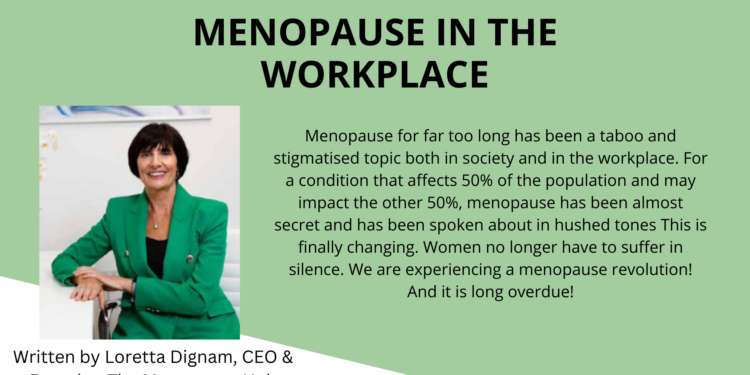Menopause for far too long has been a taboo and stigmatised topic both in society and in the workplace. For a condition that affects 50% of the population and may impact the other 50%, menopause has been almost secret and has been spoken about in hushed tones This is finally changing. Women no longer have to suffer in silence. We are experiencing a menopause revolution! And it is long overdue!

By 2030 there will be 1.1bn menopausal women on the planet, or 12.5% of the global population. That equates to 1 in every 8 people on the planet will be a menopausal woman! And every year 47 million menopausal women will enter that cohort.
Menopause is an important societal issue, an important workplace issue, an important healthcare issue and an important economic issue. The average age of perimenopause is 45 and menopause is 51. Therefore, menopause is clearly not an older woman’s condition! In the workplace in Ireland there are 350,000 menopausal women, in the UK 4.4m, in Australia 2m and in the US 27m.
The vast majority of these women will go through the menopause transition during their working lives. And, given the myriad of menopause symptoms (there are 40+) women at work can be impacted by psychological/ emotional/mental, physical and genitourinary symptoms at work.
Research* conducted by The Menopause Hub in Ireland 2021 among 1150 menopausal women highlighted the following startling statistics:
• 80% of women said that their menopause symptoms impacted their performance at work (50% said a little, 30% said a lot)
• 12% of women gave up work due to menopause
• 40% considered leaving work or cutting back their hours
• 39% took time off work due to menopause and 22% took 3 or more days
• 86% said they did not tell their employer / manager the real reason for time taking time off
The data, where it exists, in other countries is similarly shocking.
There is clearly a strong business case for supporting women experiencing menopause at work. These women are often at the peak of their skills, experience, and careers. Negative impact on self-confidence means that women are reluctant to seek promotion or forgo promotional opportunities. This is counter to all of the gender equality and diversity and inclusion work that has enabled women to progress at work in recent years.
From an organisation’s perspective there are 4 clear reasons why employers need to take note and engage in the menopause conversation.
1. Legally employers have a duty of care to their employees through the Health & Safety at Work Act
2. Employers need and want to optimise employee performance
3. In this tight talent market retention is paramount and talent attraction vital.
4. Employers are at legal risk on the grounds of gender, age and disability discrimination. There are increasing numbers of employment tribunals taking place in the UK & Ireland with decisions being made in favour of the menopausal woman.
Why hasn’t it been addressed before?
There is still a real taboo when it comes to the menopause at work. While some menopausal women receive help and understanding from colleagues and managers, many are too embarrassed to discuss the issue or think their manager would be embarrassed. 70% of menopausal women in our survey said they would not be comfortable discussing menopause with their line managers. And 60% said they would be uncomfortable discussing menopause with colleagues.
The top 5 symptoms that women said that affected them most at work were as follows:
1. Fatigue 40%2. Hot flushes 35%3. Focus & concentration 34%4. Anxiety & worry 32%5. Insomnia 30%
Often a few small practical adjustments at work could make a world of difference to those experiencing the oftenuncomfortable symptoms of menopause. However, having conversations with those affected, being empathetic and supportive, non-judgemental or prescriptive can uncover what the most effective reasonable accommodations will be. Unfortunately, few managers or HR professional are educated about menopause or confident in having an informed discussion. This needs to change and quickly.

Menopause is seen by many as a taboo topic in the workplace. What can employers do to help overcome this?
In our survey we asked menopausal women what they wanted to see employers do to better support them. The response was overwhelming, 92% wanted awareness training for colleagues, 96% wanted education & training
for managers and 93% wanted their employer to introduce a menopause policy.
It is clear that the only way to overcome the taboo and help to normalise the conversation around menopause is to start talking and educating people about the topic. Menopause is not unlike where mental health in the workplace was 10-15 years ago. And many of the programmes and structures that organisations have put in place can be adapted for menopause.

The Menopause Hub encourages employers to adopt best practice in supporting their colleagues. We offer awareness education for staff, managers, HR professionals and Menopause Champions (not unlike mental health First Aiders) who will signpost and offer support groups and buddies for those experiencing menopause at work. Through this training we want everyone to engage, as menopause is not just a woman’s issue. Having male allies is critical for progress as is senior leadership sponsorship. Many of our clients have also developed an organisational framework which encompasses training for line managers on sensitive conversations and reasonable adjustments. Many have also developed menopause workplace policies.
Interestingly the research The Menopause Hub conducted with IBEC amongst employers highlighted that
• 70% offered menopause support through their EAP services
• 47% offered flexibility for staff to schedule annual leave around appointments
• 46% said employees could avail of paid sick leave when needed
• 39% said they offered flexible working arrangements if needed
This may be the case, but clearly employees and staff are unaware that this applies to menopause and/ or are not comfortable mentioning menopause in this context. Either way, employers need to work on opening up the conversation to include menopause.
Tell us more about the support material
We have just launched our CPD accredited e-learning programme, in multi-media format, interactive with expert interviews, case studies from menopausal women, animation and quizzes. Each module is accompanied by downloadable handbooks, toolkits and guides for four key audiences: colleagues, managers. HR professionals and Menopause Champions.
All modules include practical guidance aimed at helping to normalise the conversation around menopause at work. Also included are developing frameworks of support and education, helping to create diverse and inclusive cultures. We are already working with a number of organisations who are pioneering menopause at work. Lild Ireland and NI have partnered with us and have launched their menopause policy. They are rolling out training and offer paid for consultations for their staff at our clinic. We are working with ESB, Accenture, Comreg, DCU, UCD, Irish Aviation Authority, INMO (Irish Nurses and Midwives Organisation), Queally Group, Avvio, HSE, Bar Council of Ireland, VHI, Axa, Cappagh Orthopaedic Hospital and many, many, more. We hope that more organisations will use our practical guidance to affect change and tailor to their individual organisation’s contexts and cultures.
If you could tell employers just one thing about menopause at work, what would it be?
Don’t assume that all women will experience menopause in the same way. Some might experience very few symptoms, while others might experience severe physical and psychological symptoms that can last for 10 years or more. The average length of menopause is 7.4. years and there are over 40 symptoms. One of the most important things you can do as an employer is to train line managers to be confident to have sensitive conversations that consider individual needs and offer adjustments that help with the specific symptoms that are being experienced.
*Research conducted online by The Menopause Hub in Sept / Oct 2021 among 1150 menopausal women
** IBEC Employer Survey, conducted among 272 HR Managers in Sept / Oct 2021










